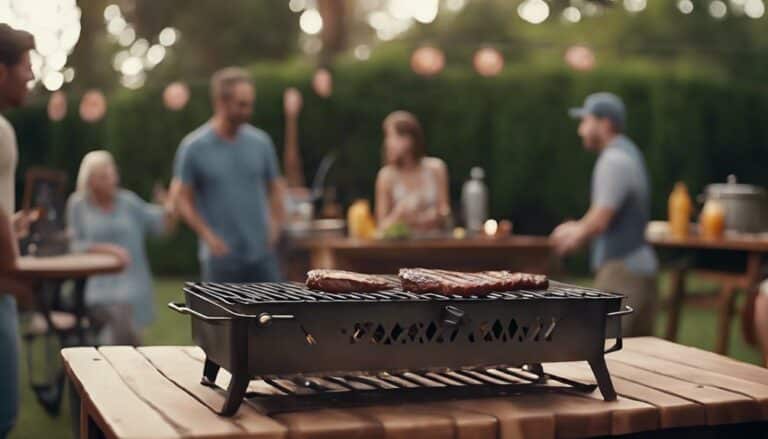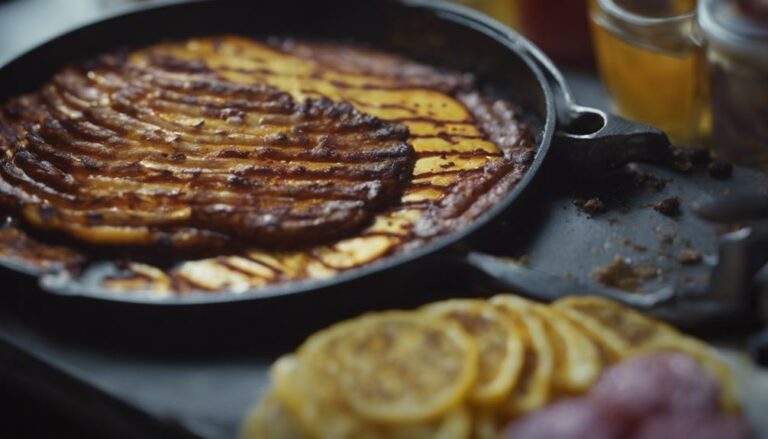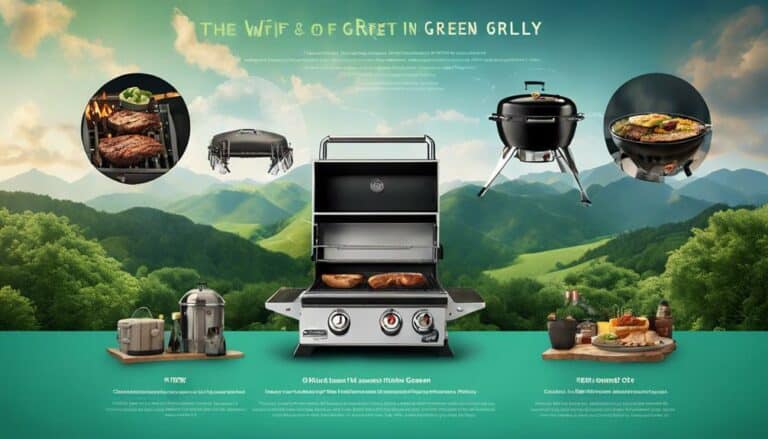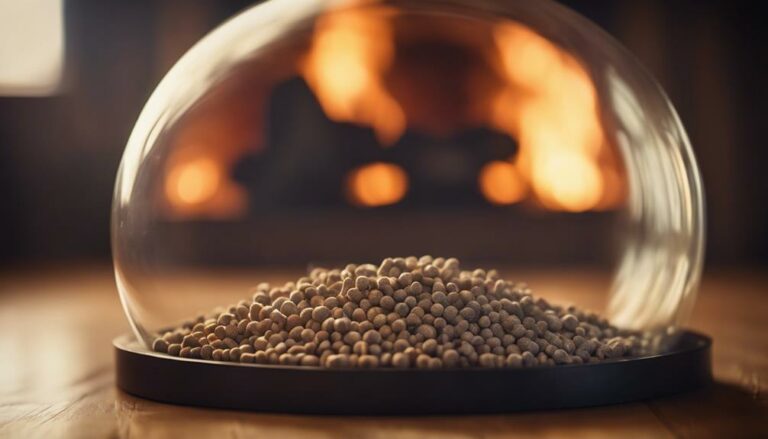I’m here to share my expertise on barbecue safety so you can grill with confidence. Think of me as your guide through the world of grilling, ensuring you have all the necessary precautions in place.
From fire safety measures to proper grill placement, I’ll cover it all. Whether you prefer gas or charcoal, I’ll provide you with the tips and guidelines you need.
So let’s dive in and master the art of safe and delicious grilling together.
Table of Contents
Key Takeaways
- Always have a multi-purpose fire extinguisher suitable for grease fires readily available and in good working condition.
- Choose a location away from flammable materials and place the grill on a stable and level surface.
- Handle propane tanks with care, ensure proper connections, and never store them in high-temperature areas or direct sunlight.
- Regularly clean the grill, including the grates, to prevent grease buildup and potential flare-ups.
Fire Safety Precautions
I always make sure to take every necessary fire safety precaution when grilling to prevent any accidents.
One of the most important measures is having a fire extinguisher readily available. It should be a multi-purpose extinguisher suitable for grease fires, which are common when grilling. Ensure that the extinguisher is in good working condition and easily accessible in case of an emergency.
Additionally, it’s crucial to have an emergency contact readily available in case things go wrong. This contact should be someone who can quickly be reached and is familiar with the location of your grill.
Proper Grill Placement
Finding the right spot to place the grill is important to ensure safety and optimal cooking results.
When it comes to outdoor cooking, grill placement is crucial. First and foremost, make sure to choose a location that’s away from any flammable materials such as overhanging branches or dry grass. This will reduce the risk of fires and accidents.
Additionally, it’s important to place the grill on a stable and level surface to prevent any tipping or accidents.
Regular grill maintenance is also essential for safety and performance. Clean the grill grates regularly to prevent flare-ups and ensure even cooking. Check the gas connections and hoses for any leaks or damages.
Lastly, always keep a fire extinguisher nearby and never leave the grill unattended.

Gas Grill Safety Tips
When it comes to using a gas grill, safety should always come first.
To ensure a safe grilling experience, there are a few key tips to keep in mind.
First, handle propane tanks with care, ensuring they’re properly connected and stored in a well-ventilated area.
Second, regularly clean your grill to prevent grease buildup, which can increase the risk of flare-ups and fires.
Propane Tank Handling
Handling propane tanks requires caution and proper training to ensure safety. Propane is a highly flammable gas, and mishandling or neglecting proper procedures can lead to serious accidents.
To safely handle propane tanks, follow these three important guidelines:
- Propane Tank Storage: Store propane tanks in a well-ventilated area away from any source of ignition. Tanks should be kept upright and secured to prevent tipping. Avoid storing them in high-temperature areas or direct sunlight, as this can increase pressure and pose a risk of explosion.
- Propane Tank Maintenance: Regularly inspect your propane tanks for any signs of damage, such as dents, rust, or leaks. If you notice any issues, don’t attempt to repair the tank yourself. Contact a professional propane service provider to assess and repair the tank.
- Proper Handling and Transportation: When moving propane tanks, always use a dolly or cart designed for that purpose. Never drag or roll the tank on its side. Ensure the tank valve is closed tightly and use a protective cap to prevent accidental opening during transportation.
Grill Cleaning Precautions
I always prioritize taking proper precautions when cleaning my grill, ensuring the safety of both myself and those around me. One essential aspect of grill cleaning is maintaining your grill brush. Regular cleaning of the brush itself is crucial to prevent the buildup of grease and debris, which can pose a fire hazard. After each use, I make sure to remove any food particles from the bristles and rinse it thoroughly with hot water. Once a month, I give it a more thorough cleaning by soaking it in a mixture of warm water and dish soap for about 15 minutes. Additionally, it is important to dispose of old or worn-out grill brushes safely. I refer to the table below for proper disposal methods:
| Dispose of Grill Brushes | Safe Disposal Method |
|---|---|
| Metal bristle brushes | Wrap in newspaper, place in a plastic bag, and dispose of in the trash |
| Wire bristle brushes | Recycle as scrap metal or dispose of in the trash, depending on local regulations |

Charcoal Grill Safety Measures
When it comes to charcoal grill safety, there are a few key measures I always follow.
First and foremost, ensuring proper ventilation is crucial to prevent the buildup of harmful gases.
Secondly, handling hot coals with care is essential to avoid burns or accidental fires.
Ventilation Importance
Using proper ventilation is essential for ensuring the safety of grilling with a charcoal grill. Without adequate ventilation, harmful gases like carbon monoxide can accumulate and pose serious health risks. Here are three benefits of proper ventilation and safety precautions to consider:
- Improved air quality: Proper ventilation allows for the release of smoke, fumes, and gases, ensuring that they don’t linger in the cooking area or your home. This helps maintain good air quality and prevents respiratory issues.
- Reduced fire risk: Charcoal grills produce high temperatures that can cause flare-ups and potentially start a fire. Good ventilation helps control the heat and reduces the risk of flames getting out of control.
- Health protection: Ventilation prevents the buildup of carbon monoxide, a colorless and odorless gas that can be deadly. By allowing fresh air to circulate, you can protect yourself and others from the dangers of carbon monoxide poisoning.
To ensure a safe grilling experience, make sure to:
- Position your grill in a well-ventilated area
- Keep the grill lid open when lighting
- Regularly clean out ash and debris from the grill
Additionally, regularly check and maintain your grill’s ventilation system to ensure optimal safety.
Handling Hot Coals
During grilling, always be cautious and use tongs to handle hot coals, as they can cause severe burns. When it comes to grill maintenance, proper handling of hot coals is crucial to ensure a safe and enjoyable barbecue experience.
After grilling, it’s important to dispose of the ash properly to prevent any potential hazards. To start, allow the coals to cool completely before attempting to handle or dispose of them. Once cooled, use a pair of heat-resistant tongs to carefully transfer the coals into a metal container designated for ash disposal. Avoid using flammable materials such as plastic bags or cardboard boxes for ash storage.
Remember to store the ash container in a safe, non-flammable area until it can be properly disposed of. By following these grill maintenance and ash disposal practices, you can ensure a safer and more enjoyable grilling experience.
Handling and Storing Propane Tanks
As I carefully handle and store my propane tank, I ensure that it’s stored in a well-ventilated area to prevent any potential hazards. Propane tank maintenance is crucial to ensure safe and efficient operation. Here are three important aspects to consider:
- Regular inspections:
It’s essential to inspect the propane tank for any signs of damage or leaks. Look for rust, dents, or loose fittings. If you notice any issues, it’s best to contact a professional for repairs.
- Proper storage:
When storing your propane tank, keep it in an upright position to prevent gas leaks. Avoid storing it near any ignition sources or flammable materials. Additionally, ensure that the tank is protected from extreme temperatures and direct sunlight.
- Propane tank disposal:
When your propane tank reaches the end of its lifespan, it’s vital to dispose of it properly. Contact your local propane supplier or waste management facility for guidance on safe disposal methods.
Safe Ignition Techniques
I always use a long-handled lighter or matches to ignite the grill, ensuring a safe and controlled ignition process. Safe handling and proper storage of propane tanks are essential for a successful and enjoyable grilling experience.
When it comes to ignition, it’s crucial to prioritize safety. Using a long-handled lighter or matches allows you to maintain a safe distance from the grill while igniting it. This reduces the risk of burns or accidents. Additionally, always make sure to keep any flammable materials away from the grill and propane tanks to prevent fires.
When not in use, store propane tanks in a well-ventilated area, away from direct sunlight or high temperatures. It’s also important to check for any leaks or damage before using the tank. By following these safety measures, you can confidently enjoy your grilling sessions while minimizing the risk of accidents.
Preventing Cross-Contamination
To prevent cross-contamination while grilling, it’s important to separate raw and cooked foods.
Always use different utensils, such as color-coded ones, for handling raw and cooked items to avoid any potential contamination.
Additionally, make sure to clean all surfaces thoroughly before and after handling raw meats to eliminate any bacteria that may be present.
Separate Raw and Cooked
One must always remember to separate raw and cooked foods to prevent cross-contamination. This is a crucial step in ensuring food safety and preventing the spread of harmful bacteria. Here are three key reasons why it’s important to separate raw and cooked foods:
- Bacterial Transfer: Raw foods, such as meat and poultry, can contain harmful bacteria like salmonella and E. coli. If these bacteria come into contact with cooked foods, they can cause foodborne illnesses. By keeping raw and cooked foods separate, you minimize the risk of bacterial transfer.
- Cross-Contamination: Mixing raw and cooked foods can lead to cross-contamination. This occurs when bacteria from raw foods are transferred to cooked foods, utensils, or surfaces. It’s essential to use separate cutting boards, utensils, and storage containers to prevent cross-contamination.
- Safe Food Storage: Properly storing raw and cooked foods separately is crucial for maintaining food quality and safety. Raw meats should be stored on the lower shelves of the refrigerator to prevent any drips or leaks onto other foods. Cooked foods should be tightly sealed and stored above raw meats to prevent any potential contamination.
Use Color-Coded Utensils
When grilling, I ensure to use color-coded utensils so that I can easily distinguish between those used for raw and cooked foods, preventing cross-contamination.
Safe food handling is of utmost importance in any kitchen, and this practice is crucial when it comes to grilling. Color-coded utensils provide a simple yet effective solution to minimize the risk of foodborne illnesses.
By assigning specific colors to different types of foods, such as red for raw meats and green for cooked foods, you can easily keep track of which utensils are safe to use. This not only helps to prevent cross-contamination but also promotes better organization and efficiency in your grilling process.
Clean Surfaces Thoroughly
I always make sure to wipe down surfaces thoroughly and use disinfectant to prevent cross-contamination. When it comes to food preparation, cleanliness is of utmost importance. Here are three key points to consider:
- Choose the right cleaning products: Not all cleaning products are created equal. Look for disinfectants that are specifically designed for food preparation areas. These products should be able to kill bacteria and other harmful microorganisms effectively.
- Follow proper cleaning procedures: Simply wiping down surfaces may not be enough. Make sure to follow the instructions on the cleaning product labels and use them properly. Pay special attention to high-touch areas like countertops, cutting boards, and utensils.
- Establish a regular cleaning routine: Consistency is key. Set a schedule for cleaning and sanitizing your food preparation surfaces. This will help maintain a clean and safe environment for you and your loved ones.
Food Handling and Storage Guidelines
I always abide by the food handling and storage guidelines for the safety of my family and guests. When it comes to food storage, it’s crucial to maintain a safe temperature to prevent the growth of harmful bacteria.
Perishable foods such as meat, poultry, fish, and dairy products should always be stored in the refrigerator at a temperature below 40°F (4°C). This ensures that bacteria don’t multiply rapidly, reducing the risk of foodborne illnesses.
It’s important to regularly check the temperature of your refrigerator using a food thermometer to ensure it’s functioning properly. Additionally, leftovers should be promptly refrigerated within two hours of being cooked or served.

Grilling Tools and Utensils Safety
To ensure safe grilling, it’s important to use high-quality grilling tools and utensils, such as tongs and spatulas, and always handle them with care.
Here are three essential safety measures to consider when using grilling tools:
- Grilling Temperature Control: Mastering temperature control is crucial for achieving perfectly cooked meals. Invest in a reliable meat thermometer to monitor internal temperatures accurately. This will ensure that your food is cooked to the appropriate doneness, minimizing the risk of foodborne illnesses.
- Proper Handling Techniques: Always remember to use oven mitts or heat-resistant gloves when handling hot grilling tools. Avoid placing tools on hot surfaces or leaving them unattended, as this can cause accidents or burns. Additionally, regularly inspect your tools for any signs of wear or damage, replacing them if necessary.
- Clean and Store Properly: After each use, clean your grilling tools thoroughly with warm soapy water to remove any grease or food residue. Dry them completely before storing them in a cool, dry place. This will prevent the growth of bacteria and prolong the lifespan of your tools.
Clean-Up and Maintenance Procedures
Maintaining cleanliness and regularly inspecting grilling tools are essential for preventing accidents and ensuring safe barbecuing. Cleaning your grill and maintaining it properly not only extends its lifespan but also ensures that your food is cooked safely and deliciously. To help you with this, I have compiled a table below outlining the recommended cleaning products and grill maintenance procedures.
| Cleaning Products | Grill Maintenance |
|---|---|
| Grill brush | Clean grease trap regularly |
| Mild dish soap | Check for gas leaks |
| Vinegar | Clean burner tubes annually |
| Baking soda | Inspect hoses for wear and tear |
Using a grill brush, mild dish soap, vinegar, and baking soda can effectively remove grease and grime from your grill. Regularly cleaning the grease trap and inspecting the burner tubes and hoses for any damage or leaks is crucial. By following these cleaning and maintenance procedures, you can enjoy safe and hassle-free barbecuing all summer long.
Frequently Asked Questions
How Do I Prevent Flare-Ups While Grilling?
To prevent flare-ups while grilling, I manage the grill temperature and prevent grease fires by keeping the grill clean and using a drip pan to catch excess fat. It’s important to monitor the grill closely and adjust the heat as needed.
What Are Some Common Mistakes People Make When Using a Gas Grill?
Common gas grill mistakes can lead to safety hazards and poor grilling results. Regular gas grill maintenance is crucial for optimal performance. Here are some tips to avoid these pitfalls and ensure a successful grilling experience.
Can I Use a Gas Grill on a Balcony or in an Enclosed Space?
Yes, you can use a gas grill on a balcony or in an enclosed space, but it’s important to prioritize gas grill safety. Make sure there is proper ventilation and follow all safety guidelines to prevent accidents.
What Are the Risks of Using an Old or Damaged Propane Tank?
Using an old or damaged propane tank can pose serious risks. Regular maintenance and inspection are crucial to ensure the tank’s integrity. Don’t take chances with safety – always prioritize proper propane tank maintenance.
How Often Should I Clean My Grill and What Is the Best Way to Do It?
I clean my grill regularly to ensure optimal performance and safety. The best way to do it is by scrubbing the grates with a wire brush and using warm soapy water for the exterior.
Conclusion
In conclusion, grilling with confidence requires following essential safety measures.
Just like a seasoned chef carefully seasons their dish, it’s crucial to take precautions such as proper grill placement, gas and charcoal grill safety, and handling propane tanks.
Just as cross-contamination can ruin a dish, it’s important to prevent it while grilling.
By following food handling guidelines and maintaining clean grilling tools, you can enjoy a safe and delicious barbecue experience.










